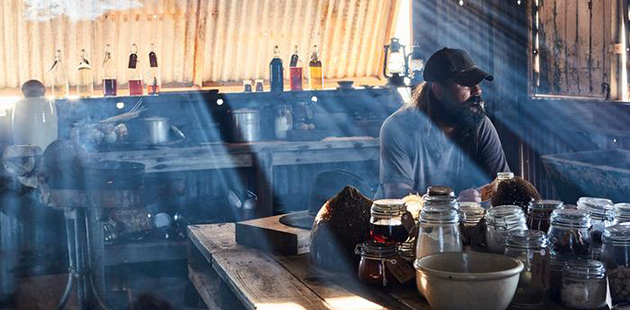 Watching Warwick Thornton’s The Beach is a journey into place and self. It made me want to breathe deeper and smell the salty air. It made me want to walk barefoot among the mangrove trees. And it made me want to eat.
Watching Warwick Thornton’s The Beach is a journey into place and self. It made me want to breathe deeper and smell the salty air. It made me want to walk barefoot among the mangrove trees. And it made me want to eat.
Thornton cooks food from the place he dwells in, the shack on the beach at Jilirr, on the Dampier Peninsula in far north Western Australia, on the land of the Baard people. You want to touch, smell and taste – and feel gratitude for how Country can provide.
Dressed in a flash black jacket and cowboy hat, Thornton arrives in his old Toyota jeep. From the start, the energetic elements of Country are apparent. Fire, water, earth and air are his constant companions – along with his three chooks (the Ladies and Man) and the spices and seeds he tenderly chops, grinds and nurtures with his hands.
Thornton’s combination of saltwater sustenance with oils and spices makes meal preparation ceremonial. As he hunts, catches and prepares the food, he transforms it – from liquid to solid to gas to artwork on (at times) extremely fancy plates. He gives us a sense of what that Country might taste like, how it might nourish your spirit.
The colours, sounds and smells of this patch of beach are alive and moving.
Energy of Country
The Beach was filmed by Thornton’s son Dylan River. And it’s beautiful. Every shot is a living, breathing piece of artwork. Country itself – this little piece of liminal space between land and sea with a one-room wood and tin shack – is as much the protagonist as Thornton himself. And the chooks. And Hermit Crabs – who pay no attention to Thornton’s requests, but carry on with their own business.
Near and far, with intimate close ups, wide panoramic views and aerial shots, River captures the colours of the land, sea and sky: their movements; the patterns they create.
Thornton’s interactions with Country are soundtracked by the sounds of the beach and its tin shack. Tin, wood, wire, glass, steel and cloth all contribute to the dialogue. Thornton’s skill at using the sound of silence – nowhere more evident than in his breathtaking and heartbreaking film Samson and Delihah – creates layered dialogues swirling in conversation with Thornton, much like the swirling tides that, at times, turn the shack into an island.
Sounds of Thornton chopping food, sharpening knives, whirling the handle of the cooker, sizzling in frypans and washing utensils are embedded in the sounds of water, wind and fire. These join with the musical notes of his guitar, sometimes played by him, sometimes played by the wind.
Read more: Warwick Thornton’s Sweet Country: a tragic investigation of race on Australia’s frontier
The kinetic energy created by Thornton’s use of tools and utensils feels like an extension of the potential energy manifesting from Country itself. It’s as if he taps into the energeticness of the place, harnessing this energy and then extending it from his own body back into place again as he holds his spear, his guitar or his pen.
Tracing patterns
Thornton’s presence and stories, River’s camera, and the beach each give glimpses into memory, time, scale and the aliveness of place. The beach is ever shifting and changing with its tides and winds and the movement of Moon and Sun. The cloud formations are undeniable story tellers.
Amid the stories of and from Country that Thornton lives and River’s camera lens sees are the stories Thornton tells. Storytelling time with the Ladies and Man; the moments between him, his guitar and its musical notes; his long shadow stretched above him and his track of footprints behind him across the sand continually speak of the journey he is on.
With the stories come the patterns and the scars. Patterns in the sand and tides, patterns in the wood that abounds, patterns in the string of the fishing net, patterns he burns into his guitar.
Thornton seems very aware of the patterns that surround him. The patterns in his life and himself he recognises and owns. The scars he carved into his arm; the Fibonacci-like spiral fractal tracks he carves in the sand with his car. As he strips away the outer layers of a coconut he strips away layers of himself to find his centre, to regain his balance.
With his last feed of oysters, provided by Country and cooked among the mangrove trees, you see the transformation Thornton experiences. By the time he’s ready to leave, you can feel Thornton’s calm: his energy has moved through the extreme heat, from the dream to reality, with the big full Moon rising.
Watching Thornton pack up and leave, I remember something he said in one of his stories: “You gonna follow, or are you gonna create your own path?”
These words stay with me long after I watch him drive away.
The Beach premieres on NITV, SBS and SBS On Demand on Friday 29 May at 7.30pm.
Review: Warwick Thornton’s The Beach is a delicate conversation with Country
Brooke Collins-Gearing, Senior Lecturer, University of Newcastle
This article is republished from The Conversation under a Creative Commons license. Read the original article.
Image: Warwick Thornton in The Beach – courtesy of SBS / NITV
